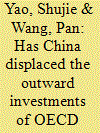| Srl | Item |
| 1 |
ID:
130538


|
|
|
|
|
| Publication |
2014.
|
| Summary/Abstract |
As China has rapidly emerged as one of the world's largest investors abroad, there has been a hectic debate in the literature on whether its emergence as a major foreign investor may have undermined the importance of western industrialised economies, including those in the Organisation for Economic Cooperation and Development (OECD). This paper aims to investigate whether this is the case. The study uses a panel dataset covering 155 countries, including 33 in the OECD, where China had invested during 2003-09. This is by far the most comprehensive dataset of China's outward foreign direct investment (OFDI). A two-stage least squared (TSLS) regression approach is adopted for our econometric models according to an established augmented gravity model in the literature. The empirical results show clear evidence that China's OFDI displaces that of the OECD countries, but the argument that China's emergence is a 'new colonialism' is not supported as OECD countries' OFDI in resource abundant host countries, particularly that in Africa and Latin America, does not appear to have been displaced by China's OFDI.
|
|
|
|
|
|
|
|
|
|
|
|
|
|
|
|
| 2 |
ID:
129196


|
|
|
|
|
| Publication |
2014.
|
| Summary/Abstract |
Indigenous peoples have been marred for centuries by the incredulous theft of knowledge they obtained, and even resources they use. The thieves are superior, more developed powers that jealously protect the rights to knowledge that is not rightfully theirs. They then refuse to recognize that the true ownership of such precious information belongs to Native Peoples. Indigenous knowledge is stolen without the slightest consideration to the powerful implications that it comes equipped with. The moral repercussions behind such an unethical system leads to loss of Native culture and sustainability and a shift from using Native knowledge and resources for social needs to profit generation. These problems are exacerbated by the use of Intellectual Property Rights (IPR), and the situation has delved to the point where nations bypass indigenous consent and wrongfully patent their knowledge and resources.
Why Indigenous Knowledge Is So Important
Knowledge of the natural world is not limited to science. Peoples spanning across the world have developed, over many years, a set of culturally rich knowledge systems that have been a result of the environments that they live in. Indigenous knowledge revolves around the environment and is of a largely ecological type. It is also referred to, by the World Bank, as the "traditional knowledge of the uses of plants" and even "ethnobotany."
|
|
|
|
|
|
|
|
|
|
|
|
|
|
|
|